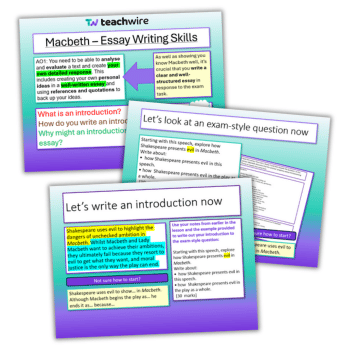Three Ways to Inspire Excellent Essay Writing in Secondary Students

Templates and PEE paragraphs can offer structure – but genuinely brilliant pieces of work come from somewhere else, says Kenny Pieper…

- by Kenny Pieper

Teaching is a difficult thing. It’s certainly a difficult thing to do every day, every week, every year. What makes it incrementally easier, though, is that we learn to improve our practice by reflecting on the trials and errors of our naive early experiences.
Teaching kids how to write excellent essays has been a bit like that for me. Reflection is all very well, but if I sat down and thought about how I taught this at the start of my career, I’d probably be embarrassed.
Without proper guidance at teacher training college, I, like many others I imagine, began routinely to issue dusted-down essay templates in the way I remembered being taught: an introduction to begin, three or four paragraphs using the PEE structure (Point, Example, Explanation) to flesh out the middle, and a rousing conclusion to finish. Thank you very much, move on.
And, here’s the thing: that does produce competent, structured pieces of writing. It’s just that they’re kinda boring and very often superficial. Merely providing a paragraph plan for writers is insufficient: without the proper knowledge of their subject, they’ll always fall flat and learn little.
So here are three other ways in which you can inspire excellent essay writing:
1. Get to the library
As an English teacher, I ask my classes to write essays all the time. Whether I’m requesting personal reflections, discursive pieces or analyses of literature we’ve studied, it is not enough merely to give students a structured plan; in fact, that may often be a barrier to their progress. Especially with argumentative-style writing, it is vital that they submerge themselves with the minutiae of the topic before they even begin to write.
If it’s a discursive topic then we go to the library and get the books out. I’m an English teacher, not a look-it-up-on-Wikipedia teacher – so the books come first. I have no problem with online research but I like my students to get used to proper research before they get writing.
We find as many facts from as many sources as we can; we look for contradictions from reliable experts; and we take a deep look into the background of our topic to get a feel for what we’re about to write.
During a project in our S4 in Scotland (Year 11), I even ask my students to browse the TED Talks page for a subject that interests them. These can be of varied quality but after watching a few of them, students begin to grasp a better understanding of something in which they’re personally interested.
When they can control the topic, they can write some amazing content. And we take it from there.
2. Load them up with good exemplars
The opportunity to bring great examples of writing into the classroom – perhaps we’ve discovered them in the Sunday papers or in a magazine, perhaps they’ve been on our shelves for years – is one of the great privileges of being an English teacher.
Handing out copies of a respected newspaper’s comment page which has enthused me in some way rubs off on my students. It stimulates discussion, argument, discourse. The ability to build up an argument can be developed through the study of great examples of the craft.
So it stands to reason that the more familiar your students become with the form, the more capable they will be of writing great essays themselves. Ensure they become used to reading the comment pages of the major newspapers – many of them are available online – and spend time on the better ones.
How do contributors introduce their ideas, build upon them and finish with a flourish? How do they use effective persuasive writing techniques to convince their readers? While you could no doubt easily remember the most argumentative students you’ve taught over the years, how many of them could get those thoughts down in writing in a comprehensible manner?
Get a copy of The Art of the Personal Essay, edited by Phillip Lopate: a wonderful collection of the best of the form. If anything, you’ll love reading it: more importantly, your students will get access to some fabulous writing.
3. Talk a good game
I’m not sure who originally said that ‘If they think it, they can say it; if they can say it, they can write it’, but I really believe it’s true. It’s why Talk is such a powerful skill when it comes to formulating thoughts and ideas.
So loading students up with rhetorical devices is vitally important. The ability to argue your case in a controlled and intelligent manner is the true test of any kind of persuasive writing, and it stands to reason that lots of time and space for Talk is so crucial.
Set up debates in class where students are accountable for the argument they want to make in their writing. Teach skills to counter-argue and pick holes in evidence, enabling students to assist each other in filling in gaps.
My class is set up in rows with three in each group. Having ten mini-debates at the same time leads to a bit of noise but if you can create a climate where it works, where everyone is on side and focusing on their task, it can be lots of fun.
Have one student argue their case with another given the job of picking holes: the third student can be the moderator. It’s a great way of allowing students to find flaws in their own arguments before starting to write. Alternatively, if the class is asked to write on the same topic, students can help each other fill any gaps in their knowledge.
And it all comes back to that, doesn’t it? If students know their subject well, they will be able to begin writing. These are a few of the strategies I’ve used successfully in the classroom over the years.
Ultimately, I want my students to write excellent essays, not just good ones, and they will be able to do that if they are knowledgeable about their subjects.
The ability to elicit that knowledge is the aim of a successful education system. Informed, articulate citizens come from, and with, the ability to construct a coherent argument and debate. If they can write it down they can become exactly that.
Kenny Pieper has been teaching English for fifteen years. He is the author of Reading for Pleasure (Independent Thinking Press, £12.99). Download our free Macbeth essay two-lesson resource pack.











